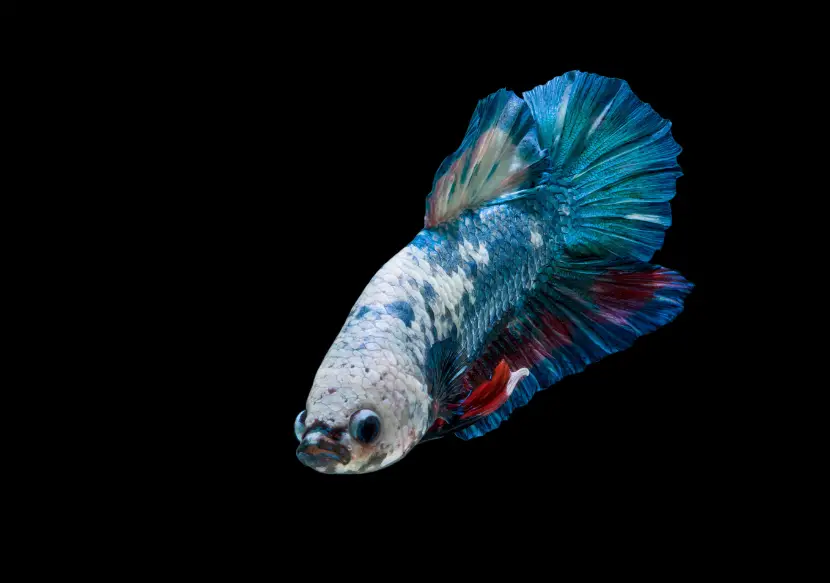Originally posted on May 15, 2023 @ 2:00 pm
Last Updated on 5 months by admin
Betta fish are one of the most popular species of fish kept as pets. They are known for their vibrant colors and seemingly endless energy. However, one common issue that can arise with betta fish is when they turn white and die. This can be a distressing situation for fish owners, and understanding the causes behind it is crucial for preventing and treating this problem.
In this article, we will explore the various reasons why betta fish may turn white and die, including environmental factors, diseases, and genetics. By gaining a deeper understanding of these causes, you can take the necessary steps to keep your betta fish healthy and thriving for years to come.
Understanding What Causes Betta Fish to Turn White and Die?
Betta fish turning white can be due to several reasons such as fungal infections, parasites, or poor water quality. If your Betta fish is turning white and showing other symptoms like lethargy, loss of appetite, or frayed fins, then it is crucial to provide immediate treatment. The best way to prevent Betta fish from turning white is by maintaining a clean and healthy environment in the tank, performing regular water changes, and providing a balanced and nutritious diet.

Understanding What Causes Betta Fish to Turn White and Die?
Betta fish, also known as Siamese fighting fish, are popular pets due to their vibrant colors and easy maintenance. However, sometimes these colorful creatures can turn white and die, leaving their owners confused and distraught. In this article, we will explore the possible reasons behind this phenomenon and ways to prevent it from happening.
1. Poor Water Quality
Betta fish are sensitive to changes in their environment, especially when it comes to water quality. If the water in their tank is not properly filtered and cleaned, it can lead to a buildup of harmful toxins such as ammonia and nitrite. These toxins can cause stress and eventually lead to the fish turning white and dying.
To prevent this, it is important to regularly clean and maintain the aquarium. This includes changing the water at least once a week, keeping the tank free of debris, and investing in a good quality filter.
2. Overfeeding
Another common cause of betta fish turning white and dying is overfeeding. Betta fish have small stomachs and can easily become bloated if they are given too much food. This can lead to digestive problems and an overall decline in health.
To avoid overfeeding, it is recommended to feed your betta fish small amounts of food twice a day. It is also important to choose high-quality betta fish food that is specifically formulated for their nutritional needs.
3. Poor Diet
In addition to overfeeding, a poor diet can also contribute to a betta fish turning white and dying. Betta fish require a balanced diet that includes protein-rich foods such as bloodworms, brine shrimp, and pellets.
To ensure that your betta fish is getting the proper nutrition, it is important to research and choose a high-quality fish food that meets their dietary needs. You can also supplement their diet with live or frozen foods for added variety.
4. Stress
Stress can also play a significant role in a betta fish turning white and dying. Common causes of stress include overcrowding, aggressive tank mates, and sudden changes in water temperature or pH levels.
To minimize stress, it is important to provide your betta fish with a spacious and comfortable environment. This includes a tank that is appropriately sized, with plenty of hiding places and decorations. It is also important to avoid adding aggressive tank mates and maintain a stable water temperature and pH level.
5. Disease or Illness
Finally, a betta fish turning white and dying could be a sign of an underlying disease or illness. Common illnesses in betta fish include bacterial or fungal infections, parasites, and swim bladder disease.
If you suspect that your betta fish may be sick, it is important to seek veterinary care immediately. Early detection and treatment can significantly improve their chances of recovery.
In conclusion, betta fish turning white and dying can be a distressing experience for pet owners. By understanding the possible causes and taking steps to prevent them, you can ensure that your betta fish remains healthy and vibrant for years to come.
Frequently Asked Questions
Understanding what causes Betta fish to turn white and die is important for any Betta fish owner. Here are some frequently asked questions and answers to help you understand this issue better.
What are the common causes of Betta fish turning white and dying?
There are several common causes of Betta fish turning white and dying. One of the most common reasons is poor water quality, which can cause stress and lead to diseases and infections. Other causes include overfeeding, temperature fluctuations, and a lack of oxygen in the water.
To prevent your Betta fish from turning white and dying, it is important to maintain a clean and healthy environment for them. This means keeping the water clean and at the right temperature, feeding them the right amount of food, and ensuring they have access to enough oxygen.
Can Betta fish turn white due to stress?
Yes, Betta fish can turn white due to stress. Stress can be caused by a number of factors, including poor water quality, overcrowding, aggressive tank mates, and changes in their environment. When Betta fish are stressed, their immune system weakens, making them more susceptible to diseases and infections. This can lead to them turning white and eventually dying.
To prevent stress in your Betta fish, it is important to provide them with a suitable tank environment and avoid overcrowding. You should also avoid sudden changes in their environment and ensure that they have enough hiding places in the tank to feel safe and secure.
What can be done to treat a Betta fish that is turning white?
If your Betta fish is turning white, it is important to identify the underlying cause and address it as soon as possible. This may involve testing the water quality, adjusting the temperature, reducing feeding, and treating any diseases or infections that may be present.
If the underlying cause cannot be identified or treated, it may be necessary to euthanize the Betta fish to prevent further suffering. It is important to seek advice from a veterinarian or experienced Betta fish owner before making this decision.
How can I prevent my Betta fish from turning white and dying?
To prevent your Betta fish from turning white and dying, it is important to maintain a clean and healthy environment for them. This means performing regular water changes, testing the water quality, and keeping the temperature and pH levels stable.
You should also avoid overfeeding your Betta fish and ensure they have access to enough oxygen. It is also important to avoid overcrowding and aggressive tank mates, as this can cause stress and lead to diseases and infections.
Is it normal for Betta fish to turn white during their lifespan?
No, it is not normal for Betta fish to turn white during their lifespan. If your Betta fish is turning white, it is a sign that something is wrong and needs to be addressed. This could be poor water quality, stress, disease, or another underlying issue.
If you notice your Betta fish turning white, it is important to take action to identify and treat the underlying cause as soon as possible to prevent further damage and ensure the health and wellbeing of your fish.

10 ways to tell if a betta fish is dying – Betta fish informational video
In conclusion, understanding the causes of betta fish turning white and dying is crucial for every betta owner. These fish are incredibly delicate and require proper care to thrive. Neglecting their needs can result in various health problems, including discoloration and death.
One of the most common causes of betta fish turning white and dying is poor water quality. Betta fish are sensitive to changes in their environment, and contaminated water can quickly lead to health complications. As a result, it’s essential to maintain a clean tank and perform regular water changes to keep your fish healthy.
Another factor that can cause betta fish to turn white and die is stress. Bettas are solitary fish and can become stressed if housed with other aggressive fish or in cramped tanks. Providing them with a comfortable and spacious environment can help reduce their stress levels and prevent health problems.
In summary, preventing betta fish from turning white and dying requires proper care and attention. By ensuring clean water, reducing stress, and providing a comfortable living space, you can help your betta thrive and live a long, healthy life.
